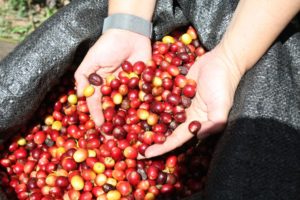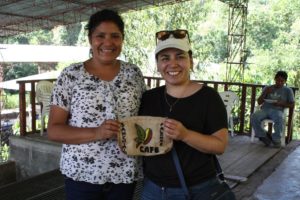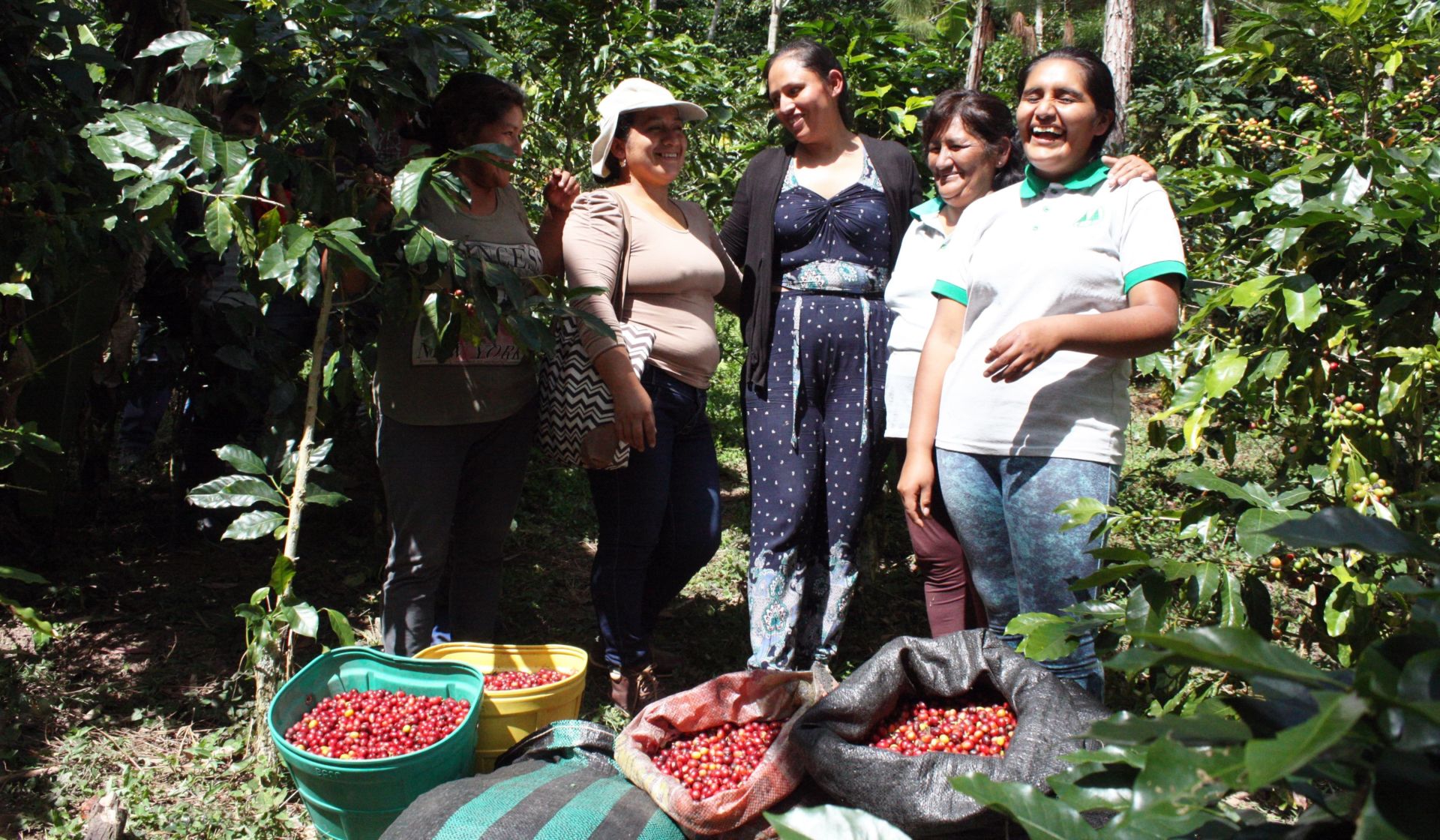How Gender Equity Grants empower women and foster the productivity of farming cooperatives. What is happening in a Root Capital project in Peru shows how far women coffee farmers can go.
 Article in collaboration with: Root Capital invests in the growth of agricultural enterprises so they can transform rural communities. These businesses purchase crops such as coffee, cocoa, or grains from smallholder farmers. With growth, they become engines of impact that can raise incomes, create jobs, empower women and young people, sustain peace, and preserve vulnerable ecosystems.
Article in collaboration with: Root Capital invests in the growth of agricultural enterprises so they can transform rural communities. These businesses purchase crops such as coffee, cocoa, or grains from smallholder farmers. With growth, they become engines of impact that can raise incomes, create jobs, empower women and young people, sustain peace, and preserve vulnerable ecosystems.
Along the impossibly steep and narrow road winding up to the village of Sanchirio Palomar, the only sounds are the rustling tree canopy and birdsong. It’s fitting, since the village’s name—a combination of Spanish and indigenous words—means “cold river with many birds.” With internet and reliable phone service only arriving last month, Sanchirio Palomar feels, at first, like a sleepy place where not much happens. But in reality, this remote Peruvian village pulses with ambition, creativity, and drive. Just ask Patricia.
Related topics: Seven Years of Women in Agriculture Initiative – Financing Women to Improve Communities – Unleashing Women’s Power
Patricia Rodriguez is a coffee farmer and long-time president of the women’s committee at the local coffee cooperative, Cooperativa Agraria de Frutos Ecológicos Sanchirio Palomar. The Sanchirio Palomar cooperative was founded in 2004 and has 171 farmer-members, 60 of whom are women. In 2009, Root Capital became their first lender—and, to this day, we remain the cooperative’s only source of financing.
In recent years, Patricia and her fellow cooperative members have weathered repeated crises—from the devastation of la roya, the coffee leaf rust that decimated production throughout Latin America in 2013-2014, to the prolonged drop in coffee prices that began in 2017. Root Capital has helped where possible; not only by providing credit and training, but also giving the cooperative a grant to purchase new seedlings during the height of the roya epidemic.
But even with this emergency support, these crises have hurt farmer livelihoods. “There are times here when incomes are low, like when roya came. There aren’t the incomes that there were before,” notes Patricia. “Our coffee has fallen from full production to now, we are still only producing 40% of what we were, and there aren’t alternative business opportunities.” And the stakes are high: lower incomes means fewer resources for critical expenses, like education. “We don’t have good educational facilities for our children. We have to send our children to Lima, Huancayo, or Pasco [for school]. It is because of this that we need more income.”

Patricia and the rest of Sanchirio Palomar’s women’s committee had ideas not just about how to increase their own families’ incomes, but also how to fundamentally improve the livelihoods of all members of the cooperative. The national government has rebranded the surrounding region as Peru’s “National Coffee Park” to encourage coffee-related tourism. The only roasting equipment is several hours’ drive away; but if the cooperative had its own roastery, they could process their coffee and sell it directly to tourists.
In some communities, women are sidelined from efforts to solve these challenges: across Latin America, traditional gender roles have long considered coffee cultivation and household income the purview of men, with rural women focused on producing food for home consumption and caring for the family. But these norms have been slowly changing—with pioneers like Patricia leading the way.
Patricia had a vision. But without the right resources, it remained out of reach. Then, with the generous support of the Wagner Foundation, Root Capital expanded our innovative Gender Equity Grants (GEGs) program to Latin America. Through the GEGs, launched in Kenya in 2016, we provide up to $20,000 in seed funding for businesses to design and implement targeted interventions to advance women’s inclusion. When it came time to disburse our first GEG in Peru, Root Capital Loan Officer Martha Valera thought immediately of Sanchirio Palomar, its women’s committee, and Patricia.

Patricia (left) with Root Capital loan officer Martha Valera (right).
In 2018, Martha and Ruth Ibarcena, Root Capital’s GEG coordinator in Latin America, began a participatory diagnostic and project development process with Sanchirio Palomar’s women’s committee. Patricia and the other members fleshed out their plan: they would use the grant to buy roasting equipment and build a roastery for cooperative members, as well as customers from across the region. And they would pair this investment with the training and capacity building needed to ensure that members of the women’s committee could run this new venture, and deliver the highest levels of quality for both roasted and unroasted coffee produced by the cooperative.
Implementing Patricia’s vision wasn’t always easy. In expanding our GEGs from Kenya to Peru, we learned a crucial lesson: To build truly robust and long-lasting inclusion for women in coffee cooperatives, which are traditionally male-dominated, we would need a longer project implementation period. In Kenya, we partnered with sorghum and macadamia nut processors, where the majority female staff engages with the business onsite on a daily basis. In Peru, women farmers make up a smaller proportion of the cooperatives’ members and are more geographically dispersed. The project development process, which took 10 months in Kenya, therefore required more time in Peru—time which we used to implement an introductory training about gender equity, as well as to build buy-in across the cooperatives’ more diffuse leadership structure.
As Martha explains, initiatives for rural women face many barriers: “Not just because of machismo—for deeper cultural reasons, it’s not easy for women to move ahead. In rural areas, women tend to be more conservative….people tend to live day-to-day, their circumstances don’t allow for long-term vision. They have to focus on making sure their kids have enough to eat, on making sure the harvest turns out OK…The women had a lot of enthusiasm at the beginning, but they don’t have a lot of time…For these reasons, the projects needed more time, to launch the business along the path, and make defined functions that everyone understands.”
 |
 |
 |
Sanchirio Palomar’s GEG project was uniquely powerful because it had the power to generate value for the whole cooperative—women and men—by providing a new service to members. Ruth recounts how, when conducting the diagnostic and project development process with other cooperatives, “everyone said they wanted to raise animals…In Peru, it is very common for cooperatives to do micro-lending projects, for women to raise hens or make tamales, but those are not about making a true business where women are really achieving commercial success.” In contrast, “the Sanchirio project…is connected to the cooperative’s core business and is adding value to the organization.”
Particularly in the context of Latin American cooperatives—where the ethic of cooperativismo, or all cooperative members working together for a common good, is so central—this kind of integration with the business’ overall needs and goals is critical. Within the first three weeks of opening their roastery, the women’s committee had roasted more than 250 kilograms of coffee for cooperative members, enabling their fellow coffee farmers, both men and women, to diversify their income streams and sell product to the local tourist market. Not only that, but the women had received a verbal agreement from the cooperative’s main buyer to purchase a full container of women-grown and -roasted coffee next year. This coffee will be sold at a premium price under their new brand, Coyanesha, meaning “woman” in Amuesha, a local indigenous language.
With these initial successes, the women of Sanchirio Palomar have launched themselves, their families, and their cooperative down the path toward higher, more diversified, and more secure incomes. In doing so, they are not just making short-term gains that will evaporate when one project ends. Rather, they are shifting the underlying conditions that prevent equitable participation and opportunity for women in their communities.

Members of Sanchirio Palomar’s women’s committee with Root Capital team members after a workshop in Lima, Peru for all Peruvian GEG recipients.
And on Root Capital’s side, the lessons from this project will continue to reverberate into the future, as we plan and implement the next stage of our strategy for the Women in Agriculture Initiative. Recognizing that farmers, especially women farmers, lack opportunities to meet and learn from each other, we recently brought all of the Peru GEG recipients together for a networking and learning workshop. We plan to deepen this model and build a full-fledged platform for peer networking for women farmers, employees, and leaders at agricultural enterprises across the globe.
For their part, even though the GEG implementation period is technically over, with their roastery launched and formal trainings completed, the women’s committee of Sanchirio Palomar sees their work as just beginning. Says Patricia, “It is going to depend on us as women entrepreneurs who are capable of forging ahead. We continue to develop ourselves, just as we have [through the project]— [before] we didn’t have that feeling of being women who could undertake projects like this, but…this opens our eyes to the many things that have been ignored, including gender equity. We are fighting to change things. It is a little difficult to succeed, but we will succeed.”
About the author: Abigail Bok is Senior Grants Associate at Root Capital
EDITOR’S NOTE: The opinions expressed here by Impakter.com columnists are their own, not those of Impakter.com. Photo Credit: Root Capital








